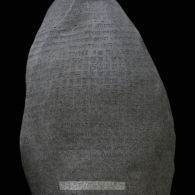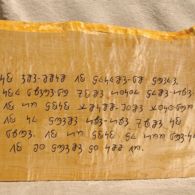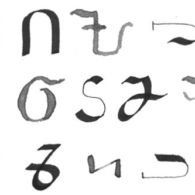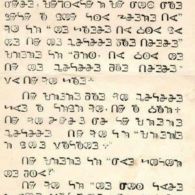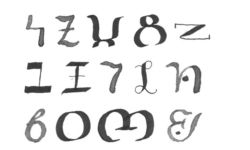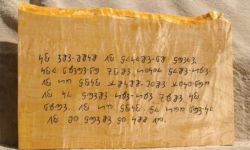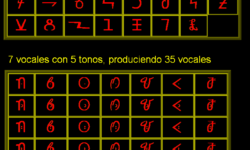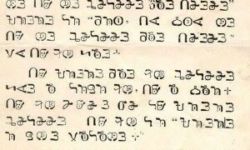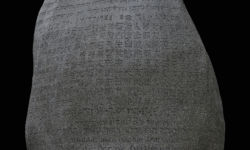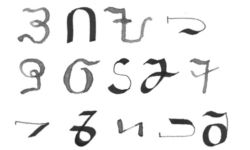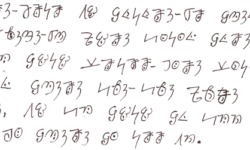Profile
Bassa Vah raises the fascinating question of whether a writing system – or any invention – is created by one person at one time, or if it is developed by countless people over a much longer period.
Bassa is the name of the people, some 350,000 of whom currently live in Liberia; vah is a Bassa word derived from the word for “sign.” Bassa Vah, then, means not so much “the Bassa alphabet” as “Bassa signage,” especially as its symbols may pre-date the writing system, deriving from signs using the natural environment: teeth marks in leaves, carvings in trees.
Over time, these signs developed into a more complex written language, but during the nineteenth century, the Vah fell further and further into disuse, and might have become extinct but for the efforts of a Bassa named Thomas Flo Narvin Lewis.
The story of Lewis’s life reads more like a legend, and some authorities have challenged several of the details. He was born in Liberia in the late nineteenth century, and, remarkably, left the country to study chemistry at Syracuse University. At this point, he had never seen or heard of the Vah.
One account by Dr Abba G. Karnga, a Bassa linguist and author, holds that that a Bassa man, Di Waɖa, first created the script and taught it to his lover, the wife of a chief, for which he was sold into slavery. In America, he taught it to his son, who met and taught Lewis. Another version says that during his pre-matriculation travels, Lewis discovered the Vah in use among ex-slaves in Brazil and the West Indies.
Determined to do his best to revive both the script and the fortunes of his people, Lewis earned a doctorate in chemistry at Syracuse University, and on his way back to Liberia stopped off in Dresden, where he ordered the first printing press specifically adapted for the Vah.
Back in Liberia, he established a school for teaching Bassa people the Vah script. Several of his students passed the Vah on, and by the 1960s, an association had been formed to promote the script and a number of students in Christian schools were able to learn it.
One active Bassa user is Peter Gorwor, who learned the Bassa Vah script from his grandfather, who, in turn, learned it in a Bassa traditional school that was part of the Poro society – a men’s secret society in Sierra Leone, Liberia, Guinea and the Ivory Coast, introduced by the Mande people. The Poro society chose to teach the Vah script along with a number of other traditional beliefs and practices – a factor that helped the Vah survive when other indigenous West African scripts fell into disuse.
He wrote to me by email:
With my elementary graduation in 1975, I moved to Buchanan to attend the Liberia Christian High School. Here, I stayed until 1982, while working with [a Christian missionary couple]; I got my high school certificate. During my senior year in high school in 1982, I got a part time job to translate Theological Education by Extension (TEE) lessons from English to Bassa, and to duplicate tapes for TEE students. At that time I had two years’ experience in Bassa writing.
Originally, the Bassa Vah was written on slate (used from a rubber tree like wood but white). The students used fire coal (charcoal) to write especially in the traditional schools. The writings were easily erased by a rough leaf that looks like sandpaper, known as yan. People began to use pencils on the slate in the early 40s.
Initially, the Bassa Vah script was written from right to left then from left to right moving right to left, left to right in parallel rows of letters … but from the 1960s the movement changed to “left to right” only, as the English.
Bassa Vah continues to survive within its very specific community, despite being described by one authority as a “failed script.” Efforts are under way to create a consistent, robust digital version of the script for the 650,000 Bassa speakers, and while it does not yet have full system support on Windows, there are web-based input tools and a Google Noto font that can be used on Windows and Mac. The Bassa Vah Historical Society is on Facebook, and the Christian Education Foundation of Liberia supports Bassa Vah on its website and has published a collection of Bassa proverbs written by Abba Karnga in English, Bassa Roman and Bassa Vah.
–Edited and updated by Eddie Tolmie.
You can help support our research, education and advocacy work. Please consider making a donation today.
Links
General script, language, and culture resources
- Omniglot
- Wikipedia
- Unicode: 2010, 2020
- Bassa-English Dictionary
- Phonology of Bassa (1975) by Jana S. Bertkau
- Encoding the Bassa Vah Script of Liberia (2018) by Charles Riley
- Scriptsource
- Orthography of the Bassa language of Liberia (Bassa Wudu-Oh Banan-Wudu in Liberia Keh), by Abba G. Karnga (PDF)
- Bassa Vah Historical Society
Community support
- Digitizing Bassa Vah
- Rhode Island College Informational Report
- A Brief Summary of Liberian Indigenous Scripts
- Bassa Singing in Liberia (YouTube)
- Alphabet Basaa (YouTube)
